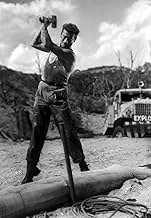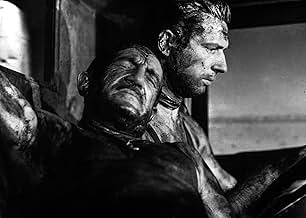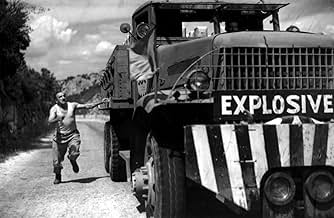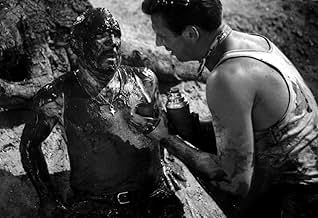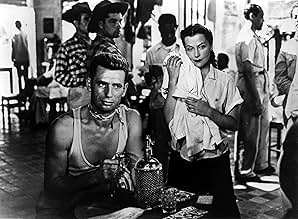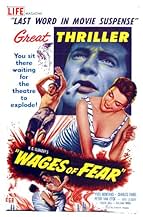In una remota località dell'America Latina, abitata solo da falliti e poveracci, quattro disperati vengono assunti da una compagnia petrolifera per guidare comuni camion carichi di nitroglic... Leggi tuttoIn una remota località dell'America Latina, abitata solo da falliti e poveracci, quattro disperati vengono assunti da una compagnia petrolifera per guidare comuni camion carichi di nitroglicerina destinata a spegnere l'incendio di un pozzo.In una remota località dell'America Latina, abitata solo da falliti e poveracci, quattro disperati vengono assunti da una compagnia petrolifera per guidare comuni camion carichi di nitroglicerina destinata a spegnere l'incendio di un pozzo.
- Regia
- Sceneggiatura
- Star
- Ha vinto 1 BAFTA Award
- 6 vittorie e 1 candidatura in totale
Peter van Eyck
- Bimba
- (as Peter Van Eyck)
Véra Clouzot
- Linda
- (as Vera Clouzot)
Darío Moreno
- Pepito Hernandez
- (as Dario Moreno)
Antonio Centa
- Camp Chief
- (as Centa)
Charles Fawcett
- Bradley
- (non citato nei titoli originali)
Riepilogo
Reviewers say 'The Wages of Fear' is a gripping film about desperation and survival, with intense suspense and masterful direction by Henri-Georges Clouzot. Critics praise Yves Montand and Charles Vanel's performances and the exploration of human resilience. Some find the initial setup slow and criticize the portrayal of the American oil company. Despite this, the film is celebrated for its innovative cinematography and thematic depth.
Recensioni in evidenza
You're living in a barren, beaten land, in South America where the lost and lonely band, no way to pay for your escape, the barrels bottom is all you scrape, this ain't the dream that had been promised, or been planned. Then your offered a way out, a chance to flee, there's a price to pay but soon you could be free, if you drive a laden lorry, you can wrap yourself in glory, $2000 you'll receive as the payee.
If only driving a wagon a few hundred miles was all there was to it. A fantastic piece of film making that demonstrates how far people can sink and what boundaries they're prepared to cross to extricate themselves from those depths.
If only driving a wagon a few hundred miles was all there was to it. A fantastic piece of film making that demonstrates how far people can sink and what boundaries they're prepared to cross to extricate themselves from those depths.
"The Wages of Fear" was awarded by unanimous verdict the Grand Prix at 1953 Cannes Film Festival where it won over 27 films, some of which were made by Jacques Tati, Alfred Hitchcock, and Luis Buñuel. Cluozot's own screenplay (based a novel by George Arnaud) focuses on four down-and-out European adventurers (Yves Montand, Folco Lulli, Peter Van Eyck, Charles Vanel) who stuck nearly penniless in a festering town in an unnamed South American country. An oil company need a load of highly dangerous and explosive nitroglycerin to be delivered to a remote well fire 300 miles away burning out of control. The route is through jungles and over crude and treacherous mountains and those men are desperate enough to take the chance. None of these men is heroic or generous, they are in for the money. The four were chosen by the managers of oil company because "if something happens to them, no one would care, they have nobody to worry about them". Henri-Georges Clouzot's view on humanity is not particularly optimistic but he finds a way to make a viewer care about disenchanted but desperate characters. Thanks to Clouzot's ability to create not only a gripping action film but a powerful study of failure, the four men will stay for long time in our memory.
Whoever it may be to rightly claim that he invented the action thriller genre (Méliès, I suppose), Henri-Georges Clouzot's "Le salaire de la peur" is an indispensable milestone on the exciting route to the best films of that kind in the 70's, 80's and nowadays. In its tenseness, as symbolized by the danger of explosion of the lorries' loads, it has hardly been surpassed.
The plot is perfectly worked out from start to end, the leading players act in some of their best parts ever, the (almost) absence of music supports the brutal realism and the consequent choice of authentic outdoor settings contributed a lot to the film's deserved success. Historically, it ranges between neorealismo and nouvelle vague, and yet it is its pure action and suspense that make it worth watching for younger audiences who wouldn't go in for just the artistic way. - Only flaw I can see is the curious, rather artificial change in Vanel's character which has no comprehensible motivation, at least for me whenever I see it.
Apart from that, Clouzot's wife Véra (also well-known from his "Les diaboliques") plays to the "most breathtaking angles" gallery when she bows down to scrub the floor of Dario Moreno's gin joint. It's a man's world after all and there are male perspectives on human survival only. Well, it's existentialism, mates. Altogether, the black and white photography is gripping. The gun scene between Lulli and Vanel is one of the best montages in film history, and there is more excellent editing in "Salaire" (including the finale) that completely fits the hot atmosphere.
The plot is perfectly worked out from start to end, the leading players act in some of their best parts ever, the (almost) absence of music supports the brutal realism and the consequent choice of authentic outdoor settings contributed a lot to the film's deserved success. Historically, it ranges between neorealismo and nouvelle vague, and yet it is its pure action and suspense that make it worth watching for younger audiences who wouldn't go in for just the artistic way. - Only flaw I can see is the curious, rather artificial change in Vanel's character which has no comprehensible motivation, at least for me whenever I see it.
Apart from that, Clouzot's wife Véra (also well-known from his "Les diaboliques") plays to the "most breathtaking angles" gallery when she bows down to scrub the floor of Dario Moreno's gin joint. It's a man's world after all and there are male perspectives on human survival only. Well, it's existentialism, mates. Altogether, the black and white photography is gripping. The gun scene between Lulli and Vanel is one of the best montages in film history, and there is more excellent editing in "Salaire" (including the finale) that completely fits the hot atmosphere.
In The Wages of Fear, four men in a remote South American town have the enviable task of transporting a metric buttload (technical term) of nitroglycerin across mountainous roads in poor condition. It's a taut, superbly suspenseful thriller, guided with a steady hand by director Henri-Georges Clouzot, who would go on to direct the classic Diabolique in 1955.
Yves Montand, in a rare dramatic role, plays Mario, the ostensible protagonist of our tale. He's been stuck in this backwater for some time, but it costs a lot of money to get out – plane fares are through the roof, and there's no train, and there's no neighboring village. In short, you're stuck there until you can buy a ticket – and pay for a passport, of course.
Mario spends his days looking for work, wooing tavern worker Linda, and despairing about the lack of work. There's an American oil company in town, but they're no longer hiring. His monotonous lifestyle is interrupted by the arrival of fellow expat Jo (Charles Vanel), a tough-looking older man who quickly wins Mario's favor at the expense of the rest of the men in town.
The oil company, in fact, has its own problem – one of their large derricks has exploded, causing a huge oil fire. Company man Bill O'Brien decides to send two trucks loaded with nitro from the town up the mountain to the derrick. (The eventual idea is to set off charges, which will somehow contain or extinguish the fire.) O'Brien has no trouble scaring up volunteers for the task, since the men of the town are largely unemployed. Four men will be selected to take the two trucks. Only one truck is needed; the second is truly just in case there's an accident with the first one. The men will receive $2000 when the work is finished, more than enough to secure passage out of the backwater.
Mario and Jo are chosen, as are Mario's roommate Luigi (Folco Lulli) and German expat Bimba (Peter van Eyck). The two trucks depart early in the morning, full of gas and of nitro. Danger awaits.
Theirs is not an easy task. The road is full of ruts. In one place, the wooden deck that trucks use to make a sharp turn up the mountain has been damaged from disuse. It's hot and muggy. And one has to be very, very careful, as even the smallest bump might set the whole shebang off. There's also tension among the four drivers – Luigi is unhappy that Mario is spending more time with Jo than with him, Mario is unhappy with what he perceives as Jo's cowardice. Bimba seems to get along with everyone, though.
The whole time I was watching this movie, I was certain not all four were going to make it. I will not spoil what is now a sixty-three-year-old movie, but I was still genuinely surprised by the ending. This ain't no fairy tale or sitcom. This is a movie about desperation, redemption, sacrifice, and comeuppance. It's not necessarily about justice.
The Wages of Fear is a singularly terrific movie from start to finish, exquisitely shot and expertly written. Its money maker is its tension, something present here in spades. The writing is impeccable; even personality changes make perfect sense within the film's context. There are intricacies within a straightforward plot. This is a must see for lovers of thrillers.
Yves Montand, in a rare dramatic role, plays Mario, the ostensible protagonist of our tale. He's been stuck in this backwater for some time, but it costs a lot of money to get out – plane fares are through the roof, and there's no train, and there's no neighboring village. In short, you're stuck there until you can buy a ticket – and pay for a passport, of course.
Mario spends his days looking for work, wooing tavern worker Linda, and despairing about the lack of work. There's an American oil company in town, but they're no longer hiring. His monotonous lifestyle is interrupted by the arrival of fellow expat Jo (Charles Vanel), a tough-looking older man who quickly wins Mario's favor at the expense of the rest of the men in town.
The oil company, in fact, has its own problem – one of their large derricks has exploded, causing a huge oil fire. Company man Bill O'Brien decides to send two trucks loaded with nitro from the town up the mountain to the derrick. (The eventual idea is to set off charges, which will somehow contain or extinguish the fire.) O'Brien has no trouble scaring up volunteers for the task, since the men of the town are largely unemployed. Four men will be selected to take the two trucks. Only one truck is needed; the second is truly just in case there's an accident with the first one. The men will receive $2000 when the work is finished, more than enough to secure passage out of the backwater.
Mario and Jo are chosen, as are Mario's roommate Luigi (Folco Lulli) and German expat Bimba (Peter van Eyck). The two trucks depart early in the morning, full of gas and of nitro. Danger awaits.
Theirs is not an easy task. The road is full of ruts. In one place, the wooden deck that trucks use to make a sharp turn up the mountain has been damaged from disuse. It's hot and muggy. And one has to be very, very careful, as even the smallest bump might set the whole shebang off. There's also tension among the four drivers – Luigi is unhappy that Mario is spending more time with Jo than with him, Mario is unhappy with what he perceives as Jo's cowardice. Bimba seems to get along with everyone, though.
The whole time I was watching this movie, I was certain not all four were going to make it. I will not spoil what is now a sixty-three-year-old movie, but I was still genuinely surprised by the ending. This ain't no fairy tale or sitcom. This is a movie about desperation, redemption, sacrifice, and comeuppance. It's not necessarily about justice.
The Wages of Fear is a singularly terrific movie from start to finish, exquisitely shot and expertly written. Its money maker is its tension, something present here in spades. The writing is impeccable; even personality changes make perfect sense within the film's context. There are intricacies within a straightforward plot. This is a must see for lovers of thrillers.
9dtb
Georges Arnaud's novel LE SALAIRE DE LA PEUR has been filmed twice, by Henri-Georges Clouzot as THE WAGES OF FEAR (1953) and by William Friedkin as SORCERER (1977). While both films are worth seeing, the earlier version is the one regarded as a classic, and rightly so. Although SORCERER goes into more detail about the political climate and the various misdeeds that led the four desperate protagonists to the South American hellhole where they accept high-paying but life-risking jobs driving nitroglycerin through treacherous terrain, WAGES... distinguishes the men's personalities better, giving the audience more rooting interest in them. Both films have excellent casts, with charismatic leads in Yves Montand (WAGES...) and Roy Scheider (SORCERER), plus WAGES... also provides feminine charm in the form of beguiling Vera Clouzot as the café waitress who loves Montand. Both films have tense action sequences as well, but somehow for all the staging and skillful editing, SORCERER's action scenes seem strangely slow, slogging along in the mud just like the protagonists in their less-than-state-of-the-art trucks. Both versions have enough good things in them to be worth a look, but if you only have the time and resources to check out one of them, it's WAGES... that really pays off!
Lo sapevi?
- QuizYves Montand and Charles Vanel both suffered from conjunctivitis after filming in a pool of crude oil and being exposed to gas fumes.
- BlooperWhen Bimba is shaving in the cab of the truck, he has the right side of his face covered in shaving cream, but when he turns to talk to Luigi the right side of his face is clear of shaving cream.
- Versioni alternativeThe film was cut for U.S. distribution in 1954, in part due to scenes that denounced crooked U.S. business interests in Latin America. The Criterion Collection laserdisc restored the film to its uncut version with 21 minutes of footage removed from other versions of the film.
- ConnessioniFeatured in Montand à la rencontre de Pagnol (1986)
- Colonne sonoreThe Blue Danube
Composed by Johann Strauss
I più visti
Accedi per valutare e creare un elenco di titoli salvati per ottenere consigli personalizzati
- How long is The Wages of Fear?Powered by Alexa
- Is this movie based on a book?
- Why do they have to carry the nitroglycerin to that plant?
- What caused the nitro to explode?
Dettagli
- Data di uscita
- Paesi di origine
- Lingue
- Celebre anche come
- Il salario della paura
- Luoghi delle riprese
- Aziende produttrici
- Vedi altri crediti dell’azienda su IMDbPro
Botteghino
- Lordo Stati Uniti e Canada
- 21.228 USD
- Fine settimana di apertura Stati Uniti e Canada
- 7633 USD
- 1 dic 2024
- Lordo in tutto il mondo
- 22.326 USD
- Tempo di esecuzione2 ore 36 minuti
- Colore
- Proporzioni
- 1.37 : 1
Contribuisci a questa pagina
Suggerisci una modifica o aggiungi i contenuti mancanti

Divario superiore
By what name was Vite vendute (1953) officially released in India in Hindi?
Rispondi
![Guarda Trailer [English SUB]](https://m.media-amazon.com/images/M/MV5BNWU5Zjk4MDAtZDM1Ni00YzJmLTkyZTUtYjVhN2VjNzZmOGVhXkEyXkFqcGdeQXRyYW5zY29kZS13b3JrZmxvdw@@._V1_QL75_UX500_CR0)
